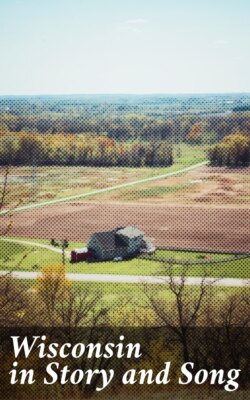Читать книгу Wisconsin in Story and Song - Various - Страница 7
На сайте Литреса книга снята с продажи.
AMONG THE CORN ROWS
ОглавлениеTable of Contents
From "MAIN TRAVELLED ROADS." Printed by permission of Harper Bros.
A corn-field in July is a sultry place. The soil is hot and dry; the wind comes across the lazily murmuring leaves laden with a warm, sickening smell drawn from the rapidly growing, broad-flung banners of the corn. The sun, nearly vertical, drops a flood of dazzling light upon the field over which the cool shadows run, only to make the heat seem the more intense.
Julia Peterson, faint with hunger, was toiling back and forth between the corn-rows, holding the handles of the double-shovel corn plow, while her little brother Otto rode the steaming horse. Her heart was full of bitterness, her face flushed with heat, and her muscles aching with fatigue. The heat grew terrible. The corn came to her shoulders, and not a breath seemed to reach her, while the sun, nearing the noon mark, lay pitilessly upon her shoulders, protected only by a calico dress. The dust rose under her feet, and as she was wet with perspiration it soiled her till with a woman's instinctive cleanliness, she shuddered. Her head throbbed dangerously. What matter to her that the king bird flitted jovially from the maple to catch a wandering blue bottle fly, that the robin was feeding her young, that the bobolink was singing. All these things, if she saw them, only threw her bondage to labor into greater relief.
Across the field, in another patch of corn, she could see her father—a big, gruff-voiced, wide-bearded Norwegian—at work also with a plow. The corn must be plowed, and so she toiled on, the tears dropping from the shadow of the ugly sun-bonnet she wore. Her shoes, coarse and square-toed, chafed her feet; her hands, large and strong, were browned, or, more properly, burnt, on the backs by the sun. The horse's harness "creak-cracked" as he swung steadily and patiently forward, the moisture pouring from his hide, his nostrils distended.
The field bordered on a road, and on the other side of the road ran a river—a broad, clear, shallow expanse at that point—and the eyes of the girl gazed longingly at the pond and the cool shadow each time that she turned at the fence.
This same contrast is expressed by Hamlin Garland in two poems presented here. The first, "Ploughing," sets forth the irksome toll to which the undeveloped boy was subjected. The second, "Ladrone," portrays the joy which the youth in the country acquires from association with the animals of the farm. These poems and all the following selections are taken from "Boy Life on the Prairie," and are here published by permission of the Macmillan Company.
